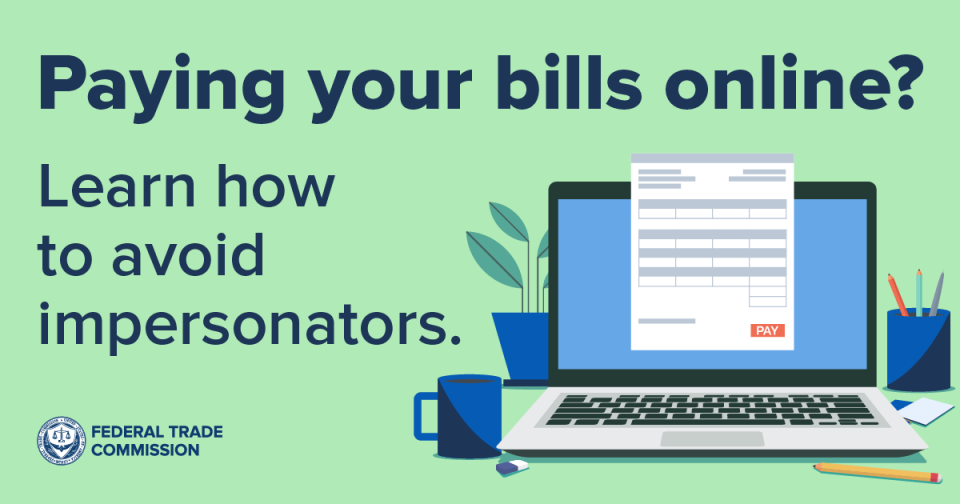If you’re paying a medical, utility, or other bill online, you probably expect to wind up on the company’s website. What might you not expect? An impersonator tricking you into paying them instead. But that’s what the FTC says a company called Doxo did. Here’s what you need to know.
According to the FTC, Doxo pretended to be an official payment site for big-name companies like AT&T, Spectrum, and Labcorp. The FTC says Doxo used online ads that looked like they were from the companies, and even used company names as keywords so Doxo’s ads would show up in search results.
If the bills got paid, what’s the problem? There’s lots of them, says the FTC. People who paid their bills through Doxo often paid fees to Doxo on top of what they owed on the bill they were trying to pay. And, in some cases, the payment never got to the company that issued the bill. People only found out when they got a warning letter from a bill collector or had their utility service shut off. Some people wound up paying late fees to the actual company that billed them — or paid their bill a second time, just to avoid other problems.
If you’re looking to pay your bill online, know that search results might not get you to the right place. Instead, check your bill to find the online payment site. And, if possible, use a credit card. Credit cards offer the most protection against fraud, including the right to dispute charges if there are any problems.
Learn more about impersonator scams at ftc.gov/impersonators. If you spot an impersonator scam, tell the FTC at ReportFraud.ftc.gov.


This is so good to know and I will share this on Facebook so more will know through my network of followers and FB FAMILY AND FRIENDS. I share all important information that the FTC sends to me via email...thank you for keeping us informed
You provided an image that was a link, words to the effect "Learn how to avoid impersonator scams". Clicking on that produced another image of exactly the same thing--no link, no information about how to avoid impersonator scams. Please fix it.
Well? Did you sue them for $MMs?
GREAT INFORMATION KEEP UP THE GOOD WORK, AND KEEP EDUCATING ME
We need to go back to writing checks or using cash and that's it. Fraud is rampant online and with credit cards, debit cards, gift cards and anything plastic.
I thank you for your reports!
I had a recording call and said I didn’t pay my electric bill and it’s being turned off in 30 minutes. When I called the number back, it went to a personal voicemail.
Happened to me. Billed twice for a $72 medical bill I was sure I paid. Thankfully I stopped doxo after a couple months when a $9 charge for their service showed up, so that was all. $72 I'll never see again.
Thanks for making all of us aware of common threats we may not otherwise have known!
I have seen sites that appear to be the legitimate website but do not open like what is familiar. I avoid these and any that pretend to look like. Lately I have received sites identified as Netflix stating my payment is overdue. Another scam. Never open these or provide any personal data. Unfortunately, many are deceived without checking their legitimate sites for verification.
Thank you for all the advice you have given though out the time I have read your articles. I've learned much...very appreciative.
So…. What are you going to do about it bc they’re still in business and still scamming people! I was one of them a couple of years ago and I didn’t realize they were charging a fee per bill I paid PLUS a monthly fee to use their fraudulent “bill pay” system. I was busy with working and taking care of a grandchild so it took me a year or so to realize what they were doing.
Writing an article about this and exposing them is great but… now what? Can you not help us get our money back? Sue? Shut them down? I went on their site when I saw this and literally nothing has changed so while I appreciate you bringing it to light, not everyone will see this, and we all are guilty of not reading the fine print of certain things when we’re stressed or in a hurry (which is often for most of us if I had to guess), so they’re still committing fraud and intentional deceptive theft. It would really help us who got screwed over by them if more than an article was posted on here….
In reply to So…. What are you going to… by Anna Carney
This blog post links to the FTC press release about the FTC action against the company and two of its co-founders. The case will be decided by a court.
Click on the words "According to the FTC" in the second paragraph of this blog and it will take you to the FTC press release, or just go here to the press release: https://www.ftc.gov/news-events/news/press-releases/2024/04/ftc-takes-a…